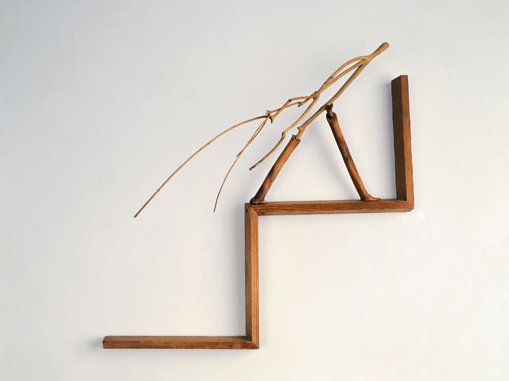Two exhibitions
dal 17/10/2013 al 4/1/2014
Segnalato da
17/10/2013
Two exhibitions
Kunsthalle Dusseldorf, Dusseldorf
"Eternal Network" (working title) undertakes to direct attention to the many-faceted work of Thomkins as a painter, sculptor and poet. Transfer Korea-NRW represents its first exchange with a non-European country and it provides thrilling insights into South Korea's dynamic art scene.

André Thomkins. Eternal Network
Works from 1950 to 1985 – Retrospective
André Thomkins (born 1930 in Lucerne, died 1985 in Berlin) was one of the most innovative and versatile artists of the second half of the 20th century. He came to the international fore with numerous artistic experiments, particularly during the 1960s. After a period of declining popularity, Thomkins, twice a participant at the documenta in Kassel (documenta 5/1972 and 6/1977), has recently been rediscovered in the context of new artistic trends. The Kunsthalle Düsseldorf is now devoting a retrospective to one of the central artists of the post-war period. Thomkins spent more than 20 years of his life in the Rhineland, and was a professor at the Kunstakademie Düsseldorf during the 1970s.
Up until now, Thomkins has been best-known for his drawings. He was an outstanding draftsman and watercolourist, and regularly focussed on the motifs and techniques of the old masters. This distinguished his work from the prevailing artistic approaches of his time. Aside from his interest in the old masters and the artists of classical modernism, Thomkins was equally involved with experimental practices in a wide variety of fields. The exhibition Eternal Network (working title) undertakes to direct attention to the many-faceted work of Thomkins as a painter, sculptor and poet. In contrast to earlier interpretations, it shows how his formal, technical and other experiments are linked to a deepening of his subject matter and to specially selected quotations. Given the current practices of young artists, Thomkins’ work is thus especially topical and relevant today.
Transformation and combination are at the core of Thomkins’ artistic strategy. “Asking linguistic and visual forms about their scope of meaning” (Thomkins, 1969) creates an “eternal network”, a constant flow and permanent interconnection of content and technique: “Art makes something out of something else. Art is homogeneous, developed from like matter” (Thomkins, 1969). Transformation and combination, as strategies of the classical avant-gardes Dada and surrealism, are the historical roots of Thomkins’ work; they have a defining effect and develop within the context of the post-war artistic movements of neo-Dada, Fluxus and nouveau réalisme, which refer back to the earlier traditions. Many of Thomkins’ artist friends belonged to these groups. Nevertheless, he also felt an affinity for the Romantic concepts of the natural and of natural creation. The Romantic image of a continually active, primal force urging development and change inspired him to adopt numerous experimental visual techniques (hinges, rowlocks, overwritten newspapers, “lackskins”, pattern repeats and objects), and influenced and fostered the spontaneity and autonomy he saw in himself. His groups of works develop by way of the existence of a corresponding equal, similar or other. They change from the two-dimensional to the three-dimensional, and freely determine and encourage one another. Motifs and materials return in new-found contexts, re-connect in both form and content and emerge in continual networks. In May 1981 Thomkins used the term “eternal network” to describe his work, and this makes him a forerunner of the artistic practices of the past decade, in which “networking” was a key concept. For Thomkins himself, the notion of the network covers the basic strategies and structures of his practice of art and life: transformation, combination and metamorphosis.
The exhibition and catalogue are being put together in cooperation with the Kunstmuseum Liechtenstein, which has held the artist’s estate since 2002.
--------
Transfer Korea – NRW
The ninth edition of the NRW KULTURsekretariat’s international art and artist exchange programme Transfer has been devoted to its partner country, the Republic of Korea, since 2011. The Kunsthalle Düsseldorf is taking part in this project together with the Kunstmuseum Bonn, the Osthaus Museum Hagen and three museums in Seoul. Transfer Korea-NRW represents its first exchange with a non-European country and it provides thrilling insights into South Korea’s dynamic art scene. After an intense dialogue that went on for several years between numerous protagonists, institutions and the 14 jury-selected artists, each participating house conceived its own exhibition that would all be shown parallel to each other.
The Kunsthalle is presenting works by six artists. One aspect they have in common is the examination of spaces marked by different cultural connotations. Luka FINEISEN and Yeondoo JUNG present in their video a staged pictorial world of the megapolis of Seoul. At the end, the morning song of the German blackbird can be heard in the background. To the extent that Kyungah HAM has her embroideries manufactured in North Korea and then smuggles them back to Seoul, the borderline experience extends here over and above the transfer of Western and Asian art production. Manuel GRAF’s installation inquires in a referential game about the cultural conditionality of space. By linking cultural-specific articles of everyday use, Erika HOCK unfolds webs of relationships between cultural ideas and individual dealings. Kira KIM has assembled a mosaic of film images that demonstrate the dependency between the environment and everyday life.
This exhibition was made possible thanks to the support of the Embassy Branch Office of the Republic of Korea in Bonn and Samsung Electronics GmbH. The Transfer project is supported in particular by the NRW KULTURsekretariat and the North Rhine Westphalian Ministry for Family, Children, Youth, Culture and Sport.
www.transfer-korea-nrw.com
Image: André Thomkins, Wanderer, n.d. (um 1957) Holz und Nägel Ca. 41,5 x 43 x 14 cm. Foto: Heinz Preute, Vaduz
Press and Communication
Dirk Schewe Tel.: +49 (0)211 89 96256 Fax: +49 (0)211 8929576 presse@kunsthalle-duesseldorf.de
Opening October 18th, 2013 at 7 pm.
Kunsthalle Düsseldorf
Grabbeplatz 4 D-40213 Düsseldorf
Hours
Tuesday – Sunday, public holidays: 11 am – 6 pm
Entrance
Adults EUR 5,50
Concessions EUR 3,50
Groups (10 or more) EUR 3,50
Disabled free
Young persons under age 18 free



